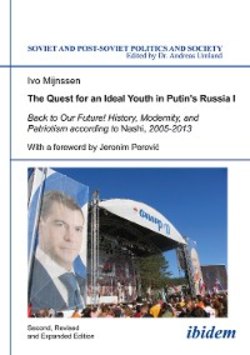Читать книгу The Quest for an Ideal Youth in Putin's Russia I - Ivo Mijnssen - Страница 6
ОглавлениеNashi, which means «Ours» in English translation, was founded in 2005 and claimed several tens of thousands of members in dozens of Russian regions at the peak of its existence during 2005-07. Although a large organization, it is certainly not to be compared with Soviet youth organizations, such as the «Young Pioneers», or «Komsomol», with memberships in the tens of millions. In fact, many Russians are not even aware of Nashi’s existence, as opinion polls show. Yet because Nashi is an organization initiated and founded directly by the Kremlin, as is widely acknowledged today in the literature, looking into its organizational structure, slogans, manifestos, and actions help to better understand state ideology and goals. What politicians like Putin might not find suitable to utter publicly, the leaders of Nashi, the so-called «commissars», never hesitate to do.
Nashi was founded with a clear purpose: To prevent a Russian repeat of Ukraine’s 2004 Orange Revolution. Nashi’s task was to mobilize youth in support of the government, ensuring that people loyal to Putin controlled the streets, thus preventing a scenario in which a mass movement was able to overthrow the existing regime. Nashi draws its legitimacy from Russia’s heroic past, namely the war against Nazi Germany, or what Russians call the «Great Patriotic War». Nashi sees itself as a defender of homeland and history. Nashi defines all of what it considers Russia’s foes today, be these international organizations, NGOs, individuals, states or internal opposition groups, to be «fascist», equating them with the Soviet Union’s enemies in WWII.
Over two decades have passed since the collapse of the Soviet Union. To an entire generation of young people, this mighty empire seems already a thing of a distant past. A majority of young Russians in Moscow, St. Petersburg or Nizhny Novgorod profess similar values, and share the same interests as young people in Rome, Paris or Berlin. Most are apolitical and seek to pursue their individual happiness. Yet, as the example of the youth movement Nashi demonstrates, the Russian state under Putin has long recognized the vast strategic resource that young people represent in building a new Russia, and the government has put considerable effort into forming a «patriotic» youth with visions similar to those of Putin’s strong and united country over the past decade. In fact, since the founding of Nashi in 2005, Russia has seen other
